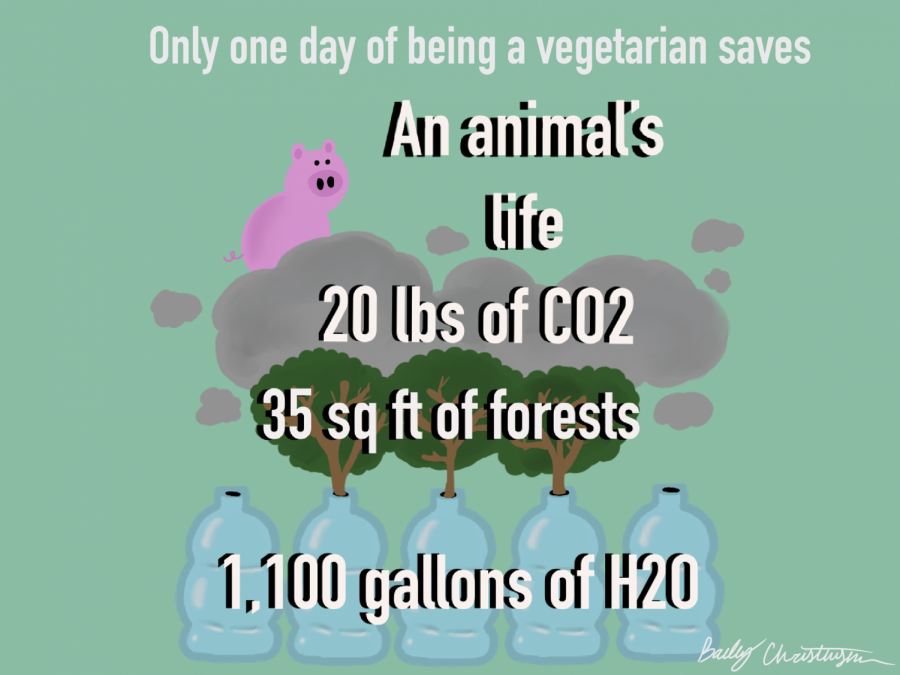Meatless meals: A simple alternative
More vegetarian meals weekly will yield great environmental benefits
Cartoon created by Bailey Christensen
Implementing just one more vegetarian meal into a diet per week can have vast environmental benefits
March 30, 2020
With the rising environmentalist movement, many have tried creative solutions in order to maintain the planet’s health. Thrifting and composting (among other options) aim to promote a lifestyle for the betterment of the environment. While choices like these are noble in their pursuit of creating an environmentally sustainable life, adding three more vegetarian meals per week is an easily achievable alternative to help keep Earth healthy.
Unlike other attempts to be eco friendly, switching to three vegetarian meals every week is not difficult to accomplish. The Vegetarian Resource Group, an organization dedicated to educating citizens about healthy lifestyle choices, suggests many Americans already eat one or two vegetarian meals a week. Most people incorporate these meals into their diet whether they know it or not. Creating a weekly diet adding two or three more meatless dishes will take little effort for most Americans. Conversely, composting takes a vast amount of time and work to be effective.
“With frequent turning, compost can be ready in about 3 months, depending on the time of year,” The University of Illinois, in the article “The Composting Process”, stated. “In winter, the activity of the bacteria slows, and it is recommended that you stop turning the pile after November to keep heat from escaping the pile’s center. In summer, warm temperatures encourage bacterial activity and the composting process is quicker.”
Though not without its environmental benefits, composting eats up a lot of time, making it an undesirable option for some people wanting to become more eco friendly. Implementing more vegetarian meals into a diet is accessible for many Americans and requires little effort compared to composting.
Likewise, thrifting, while an effective way to be environmentally conscious, is an unsavory choice for some Americans. Thrifting stores do combat fast fashion businesses and reduce pollution, but many people still refuse to buy from anywhere else other than name brand shops. This likely cannot be changed easily. People who do not regularly thrift will not suddenly begin buying clothing from places like Goodwill; however, many Americans already eat multiple vegetarian meals per week. Lessening meat consumption in a diet will be more achievable than starting to buy their clothing from thrifting stores, no matter the environmental benefits.
Not only is switching to more meatless meals every week an achievable lifestyle choice, but it is effective.
“Eliminating the transport of food for one year could save the GHG equivalent of driving 1,000 miles, while shifting to a vegetarian meal one day a week could save the equivalent of driving 1,160 miles,” The Center for Sustainable Systems at the University of Michigan, in their “Carbon Footprint Factsheet,” said.
Adding more of these meals only increases how much pollution can be saved. If even half of all Americans adopted this lifestyle, the environment would benefit greatly from less consumption of meat.
More vegetarian meals are easy to incorporate into any diet and offer great environmental benefits. Compared to composting and thrifting, Americans are more likely to adopt eating meatless dishes. This method can be accomplished by simply buying different groceries for the vegetarian meals and people won’t have to cut meat out of their diet entirely. Five to seven meals without meat per week would equate to just around 28% of a diet and it would be healthier for many people.
ChooseMyPlate suggests fruits and vegetables fill half of a plate for any meal of the day, with only 20% of the plate being dedicated to meat; however, many Americans do not follow this. The average citizen in the United States intakes 10 ounces of meat a day, doubling the recommended daily allowance. Overconsumption of meat can lead to cardiovascular disease, diabetes, obesity and other chronic conditions. Implementing more vegetarian meals can help reduce the over-eating of meat for many people, thus benefiting their overall health.
The addition of more vegetarian meals in a diet is more accessible than composting and thrifting, while also benefiting physical health and the environment. Though the ladder two may have more impact, the difference in accessibility makes a diet change easier for average Americans to achieve. Many already consume vegetarian meals throughout the week, meaning implementing one or two more won’t be as different of a change as thrifting or take up as much time as composting.
Both thrifting and composting are noble in their pursuit of living an eco friendly life; however, eating a bit more vegetarian meals is much simpler to do while still yielding environmental benefits. More people being conscious about the Earth is one of the greatest ways to improve the planet’s health. A solution like this can serve as a gateway for many Americans wanting to make more of an impact but not have to change much from their daily lives. Of course composting and thrifting will help the environment, but eating more vegetarian meals is much easier to accomplish during day-to-day life. Hopefully more Americans will adopt these two lifestyle choices, but meatless plates can impact the environment greatly with little effort.







